'Death Stranding' Bridges Gaming And Cinema In One Of The Year's Most Satisfying Experiences
Video games are not required to be fun in a traditional sense. They just aren't. So, if the entertainment medium is ever going to evolve artistically rather than stagnate and regress with the zombified fad of online competitive multiplayer, money pit loot boxes, time-wasting mobile games, and the first-person shooter obsession that has oversaturated the market more than superhero films could ever do for the movie industry, it's going to take an awakening from consumers that gaming, even at 61 years old, is still in its infancy having nowhere near tapped into its unprecedented potential as a legitimate art form.
Not to go on a lengthy detour regarding the mixed critical and commercial reception Hideo Kojima's (instantly recognizable for the iconic Metal Gear Solid franchise and his status as one of gaming's only true auteurs) latest masterful accomplishment Death Stranding has received, but it's difficult to accept that many of its naysayers went in to the 50-plus hour experience with the notion presented above: gaming does not and should not be limited to conventional methods of entertainment or whatever is trending, or what's to be expected from a mainstream AAA blockbuster title.
Additionally, Sony deserves a firm pat on the back for backing such expensive and risky experimental projects (a lesser gamble is Neil Druckmann's upcoming The Last of Us 2, which is still undoubtedly going to be an action-packed third-person survival horror shooter but is already alienating close-minded gamers with its lesbian romance serving as the backbone of the narrative), whereas Microsoft is still pumping out Halo and Gears of War installments years beyond their expiration dates. Again, if you think Hollywood is bad with sequels and remakes, I present to you the current dark times of the big-budget gaming industry, where artistic integrity is near extinct.
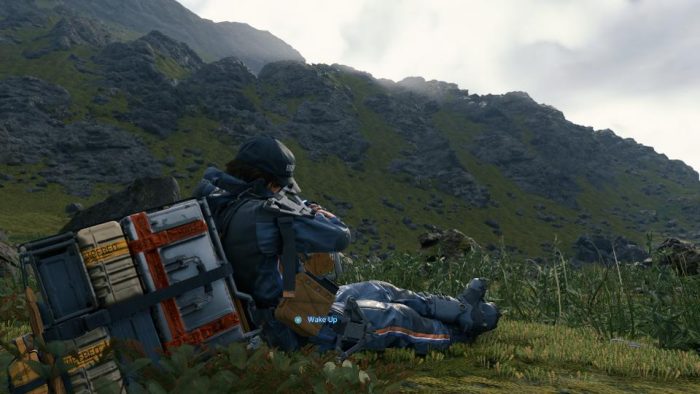
Hideo Kojima and publisher Konami actually had to sever ties with one another as the latter only cared about pressuring the game designer to churn out unnecessary Metal Gear Solid titles that his heart was clearly never fully into (Metal Gear Solid V: The Phantom Pain is basically half of a game, with a rushed and meaningless story bookending repetitive gameplay containing no purpose). At first, a compromise of sorts seemed to be reached that would allow Kojima to reboot Konami's dying Silent Hill series collaborating with Oscar-winning director Guillermo del Toro (he signed on to design the various monsters that would be present), only for that to also fall apart. If you're wondering what the hell Konami is interested in doing as a gaming publisher, the answer is simple: selling out with mobile games designed to nickel and dime consumers over time while also manufacturing slot machines for casinos. Oh, how times have changed for one of the most influential gaming studios of the past few decades.
In this scenario, Sony and Death Stranding are equatable to Netflix and The Irishman, giving arguably the most revered and ambitious director of its industry a blank check to do whatever the hell he wants in the name of art. For anyone not familiar with the works of Hideo Kojima, that means writing a story so bizarre and quirky that it's more respectable to dismiss the game entirely for that reason alone rather than its unorthodox gameplay. As weird and offputting as his ideas might be, there is unparalleled ambition behind them, which is unquestionably why lauded talent of the film industry is so willing to collaborate with him. Without corporate interference restricting Kojima for the first time, Death Stranding was always going to be full-tilt loony.
Norman Reedus provides his motion capture likeness and voice to Sam Porter Bridges, a package courier aimlessly living out the post-apocalypse performing his duties as an empty shell of a man without concern whether he lives to see tomorrow or not. From what we know, there was a large bang that destroyed the world, known as the Death Stranding for leaving behind towering invisible paranormal entities with umbilical cords connected to them capable of causing destruction (there's more to it than that, but it's best to keep things simple when explaining the insanity here). Rainfall also became laced with a property causing accelerated aging upon everything it touches. Nevertheless, the outside world was rendered uninhabitable, giving newfound and incredible importance to couriers around the world, especially the kind like Sam that are "repatriates" (his soul can return to its body following death, bringing him back to life).
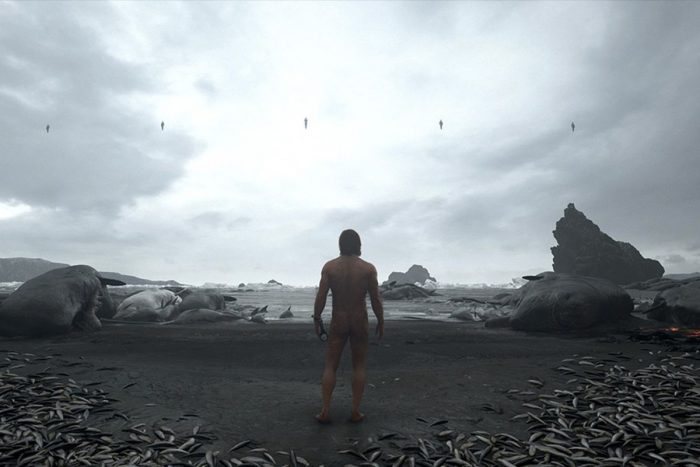
Sam quickly comes into contact with a BB (babies inside of jars that were used for experimental tests as they carry a spiritual link to their deceased mothers, granting them the ability to spot these ghosts referred to as BTs, short for Beached Things). From a gameplay standpoint, this is one area where Death Stranding is bold like no other, implementing mechanics such as rocking the baby to sleep or to reduce stress by gently motioning the controller; Kojima is genuinely banking on the player developing a paternal bond with the little one, gradually increasing the emotional stakes as we learn more about Sam and his previous family. Sure, it's similar to the dynamic between Joel and Ellie found within The Last of Us, but that still falls somewhat into conventional gaming story structure around violence and self-defense. This is something infused with love and care, warming hearts whenever BB audibly finds pleasure such as floating down a river or receiving attention from basic interactions, and of course, genuinely heightening nerves whenever BB is frightened by nearby supernatural entities or the human enemies (a rogue group of couriers that have become so addicted to the job that they now steal shipments for delivery and attack on-site).
Bonding with a baby is still nowhere near as daring as Kojima constructing a 50-plus hour game that contains minimal combat; there are encounters with these enemies but the objective is never to kill them. The majority of weapons in the game are actually nonlethal. For plot reasons that are explained, these encounters are more about returning the entities to the other side (interdimensional Beaches serve as a plane of existence between the living and the dead, hence the aforementioned term Beached Things) whereas human enemies are easily dealt with by tying them up or a simple three punch combo (reminiscent to Metal Gear Solid) meant to harmlessly knock them out.
Instead, the majority of your time spent wandering desolate America found within Death Stranding consists of traversal and delivering packages. There are a plethora of fascinating supporting characters along the way; Guillermo del Toro provides his likeness to a literal Frankenstein character wrestling with what it means to be alive and human, art-house film director Nicolas Winding Refn portrays a scientist rigging himself to somehow safely enter cardiac arrest and search for his dead family on his own personal Beach, Lea Seydoux's Fragile is one of the best female characters Kojima has ever written, Margaret Qualley has a dual role playing twins that end up saying something beautiful about the afterlife, and Tommie Earl Jenkins nails a layered role as a special forces commander, all helping Sam out with the endgame of reconnecting and uniting America.
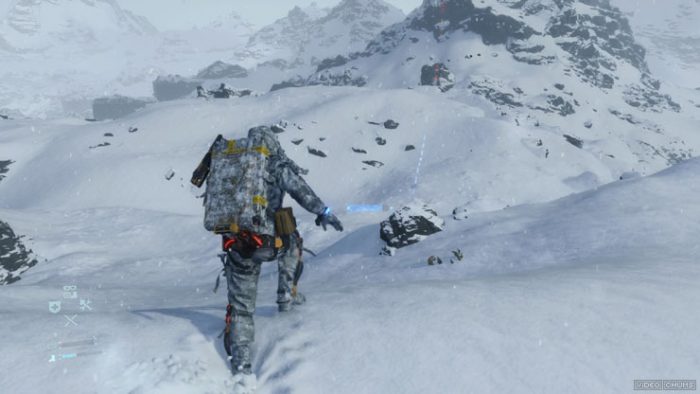
Political commentary is not lost on Kojima; it's possible to infer what these characters are living through as a possible version of our own future if climate change is never resolved, the game's unofficial motto appears to be "Make America Whole Again", and for as disastrous as everything else in the world is, there's the novelty of a female president. Nevertheless, Sam is instructed to build infrastructure across the country dubbed as the Chiral Network, which is basically society's second go at the Internet, coupled with some thoughtful commentary on the narcissistic and shallow ways society currently utilizes online environments.
Rather than killing one another in pointless deathmatches, Death Stranding integrates a connected universe for players around the world; if you rebuild a road in your game there's a chance it might appear in someone else's game, easing their own traversal, and vice versa. What starts out as hiking trips eventually transforms into scaling snowcapped mountains, with many devices at your disposal to get around (by the end of the game I had an assortment of zip lines meant to get around quickly for myself, but more importantly, it made me feel good lightening the journey for someone else). The game doesn't necessarily need online integration, but the fresh approach is another case of damning evidence that the gaming industry needs to start pushing itself forward, or at least keep throwing Kojima money to advance the art form.
Beautifully, encounters with NPCs materialize into something more than random fetch quests. Of course, some are as mundane as delivering someone a pizza, but there are some interactions between individuals ranging from spiritualists to scientists to cosplayers to film buffs and more. Without question, Kojima is throwing these things in to back some of his most dedicated passions (there's even a document where Guillermo del Toro's Deadman advises players to watch The Shape of Water), but there is a deeper conversation to be had about the ways humanity copes with trying to understand things that cannot be explained. Everyone searches for meaning in their own way, and what sounds silly to someone else might be soul-stirring for another individual. In that same way, Death Stranding might sound like absolute nonsense to some of you readers, but I assure you it's a profound experience where the last thing on its mind is functioning as a traditional video game.
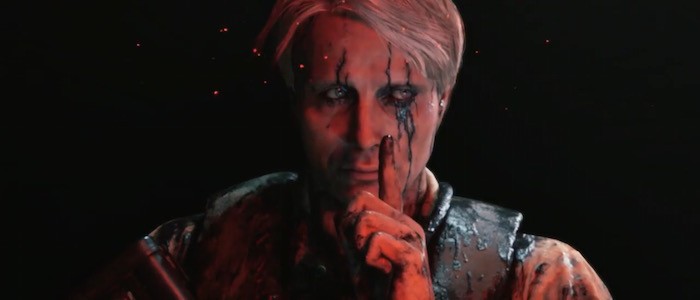
There is also justification for the daunting amount of time it takes to complete the game. While many games of this length feel padded to make the player feel like they got their money's worth, there's a reason for this scope. Sam's existential odyssey across America from the East Coast to the West Coast promises a meeting with Amelie, a sister figure of sorts (he is also the nonbiological son of the aforementioned female President Strand) shrouded in mysterious questions. Kojima leverages wonderful confusion before revealing all in, no typo, an interactive two-hour ending that ties every one of its plot strands together; the bravery of fatherhood, evolution, the resistance of humanity, value of time, the false sense of connection the Internet can provide, and the finality of death, to name a few.
Sporadically, Sam is also sucked into Beaches that resemble past war zones, introducing Mads Mikkelsen as a soldier hell-bent on retrieving BB for unknown reasons (there are fragmented flashbacks to what happened every time Sam plugs into BB). As one would expect, this sees Kojima in his wheelhouse to comment more on the horrors of war, but this villain is far more complex than Troy Baker's Higgs, a golden-masked nutjob that can manipulate BTs and plans on accelerating the process of human extinction. Both build to some unforgettable boss fights (the final battle against Higgs, in particular, is a more refined version of the epic final encounter from Metal Gear Solid IV: Guns of the Patriots), but when all is said and done it's impossible to deny that Mads Mikkelsen delivers an Oscar-worthy performance in a video game.
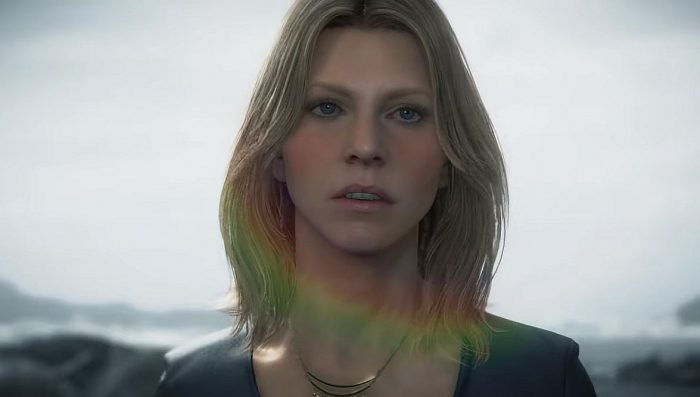
There's no denying that Hideo Kojima has a warped mind, but his vision is often arresting and strikingly complex regardless of its weirdness or plausibility. He also wisely surrounds himself with individuals that are willing to give their all, transcending his B-movie premises usually into something emotionally devastating. No, Death Stranding is not perfect (the menu system is clunky and some sections do drag), but the crushing isolation trekking across an empty and barren America on a quest for closure is as powerfully resonant and similar to James Gray's recent Ad Astra. The length doesn't feel punishing, but rather reaffirms the weight and gravitas behind this monumental mission. Not only is there satisfaction upon reaching the destination, but the two-hour ending is not without one last task destined to leave those that can get on the wavelength of Death Stranding into a puddle of tears (aided by a phenomenal score from the indie rock band Low Roar, original compositions from Ludvig Forssell, and heart-piercing vocals from Jenny Plant).
The industry needs ambitious minds like Hideo Kojima if it ever wants to progress not just as an art form, but beyond the disappointing current state of gaming. Keep your loot boxes and competitive online multiplayer games of the month, and check out Death Stranding for a taste of how emotionally satisfying gaming can be and the unlimited heights it has as an art form. Gaming is in for its own Death Stranding if the industry continues to shrug its shoulders at ambition this gargantuan. This one resonates with the force of an extinction blast.
/Film Rating: 9.5 out of 10
